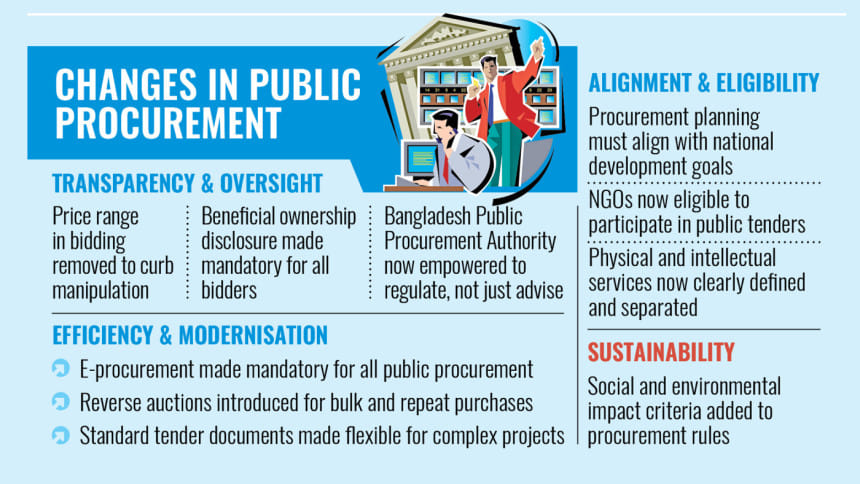Procurement law revised to cut graft, boost transparency

Scrapping the price range cap for bids, making e-GP mandatory for all public procurement and allowing NGOs to compete for tenders, the government has overhauled the public procurement law.
The new law, titled "Public Procurement (Amendment) Ordinance-2025", has withdrawn the provision which used to allow tender bid prices to vary by 10 percent from government estimates in project budgets.
"This move is intended to curb project cost overruns and avoid price manipulation during implementation," said Shah Eyamin-Ul Islam, director of Bangladesh Public Procurement Authority (BPPA), which was formerly known as Central Procurement Technical Unit.
The government allocates around $30 billion in the budget every year for public procurement.
The price range for tender bids was introduced in 2016 in the former Public Procurement Rules 2008, and it has been withdrawn over professional concerns, he said.
Although the ordinance does not specifically state that there is no such price range at present, it will be clarified through the issuance of rules which are being formulated, he said.
The ordinance was issued through a gazette on May 4. It also makes the use of the e-Government Procurement (e-GP) portal mandatory for all public procurement, aiming to increase transparency and efficiency.
Less than 65 percent of all government purchases are made through the e-GP, which was introduced in 2011.
According to Islam, the ordinance has also redefined the procurement categorisation system.
Traditionally divided into three categories—goods, works, and services—the new structure replaces "services" with two distinct, broader categories—physical services and intellectual services.
This includes outsourced services like catering and event management, which have significantly evolved over time with growing demand and will now be separately recognised.
"This expansion brings long-overdue recognition to services that were growing but not clearly classified," said Islam.
He also said the ordinance emphasised that the main goal was to align Bangladesh's procurement framework with international standards.
This has been recommended by longstanding development partners such as the World Bank, which has been supporting reform projects involving the country's procurement processes since 2001, he said.
These reforms are expected to modernise the procurement system and restore stakeholder confidence while ensuring effective implementation of government projects, he added.
Faruque Hossain, procurement policy consultant for the Ministry of Power, Energy and Mineral Resources, pointed out that separation of the service types was a fundamental structural reform.
"Earlier, the Public Procurement Rules 2008 only recognised 'services' under a single broad category, often limited to intellectual and professional services such as auditing, financial management, or software development," he said.
"Over time, it became evident that this was too narrow," he said.
Hossain elaborated that services are now distinctly classified into two categories—intellectual services, including consultancy, auditing, and software development; and physical services, such as event management, operations and maintenance, and workshop management.
The previous framework forced procuring entities to follow procedures suited for intellectual services even when procuring physical services, creating inefficiencies.
The new law addresses this gap by explicitly recognising physical services, allowing for more appropriate procurement mechanisms.
Another critical reform is the inclusion of non-governmental organisations (NGOs) as eligible bidders.
"Previously, NGOs were excluded due to structural differences in how they operate. NGOs typically receive funds before they go for spending, whereas contractors spend first and are reimbursed later," said Hossain.
"This discrepancy barred many capable NGOs—especially in sectors like health, education, and social services—from participating in tenders," he explained.
Under the new ordinance, NGOs registered and authorised by the appropriate regulatory body can now participate in public tenders, opening up avenues for delivering grassroots services through competitive selection.
The reform also introduces flexibility in the use of standard tender documents.
"In the past, the use of the government's standard tender documents was mandatory in all cases," said Hossain.
"Now, if a procurement is of a particularly complex nature, procuring entities may use internationally recognised documents—such as those from FIDIC (International Federation of Consulting Engineers) or British standards—with prior approval from the BPPA," he said.
This shift is expected to accommodate complex infrastructure projects where local documentations may fall short.
Another significant policy change is on allowing negotiations in the procurement of physical services.
"Negotiation was previously reserved for intellectual services. Now, for physical services—such as event management or operational support—negotiation is permitted under specific conditions. This flexibility was long overdue," he added.
Hossain pointed out that the government removed the 10 percent price range in national competitive bidding and a 5 percent limit in limited tendering to enable bidders to offer more realistic and market-driven prices.
Iftekharuzzaman, executive director of Transparency International Bangladesh (TIB), welcomed the reforms, especially one that encourages joint ventures (JVs) between local and foreign firms to place bids in large projects.
"Such partnerships can boost capacity and reduce wastage if done with integrity," he said.
However, he warned that the involvement of NGOs in tenders must be closely monitored to prevent misuse of their nonprofit status through commercial endeavours.
"Without regulatory safeguards, entities may blur the line between development and profit, eroding accountability," he cautioned.
The ordinance also formalises sustainable public procurement. Unlike the 2008 rules, which ignored environmental and social impacts, the 2025 ordinance mandates consideration of energy efficiency, ecological impact, and social inclusion in evaluating bids.
While the reforms reflect a bold vision, stakeholders agree that successful implementation is key. "Even well-crafted laws can be undermined without strict monitoring and institutional integrity," Iftekharuzzaman concluded.

 For all latest news, follow The Daily Star's Google News channel.
For all latest news, follow The Daily Star's Google News channel. 



Comments